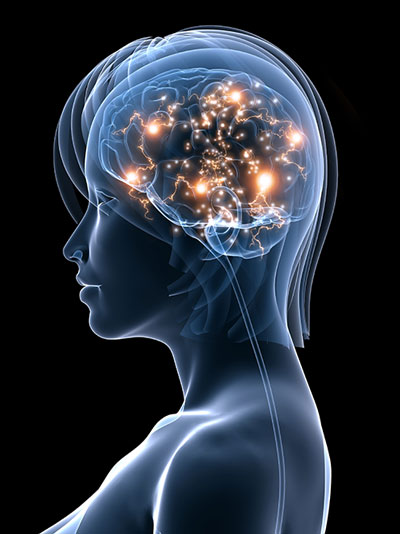Estrogen stimulates the growth of neurons, and even repairs damaged neurons.
Some of the well documented effects of estrogen on the human brain include: protection from amyloid protein (Alzheimer’s) and injury due to loss of blood flow or even low blood sugar. Estrogen stimulates the growth of neurons, promotes branching, and even repairs damaged neurons.
Unfortunately, the incidence of Alzheimer’s Disease is higher in women than men. Older men actually have higher estrogen blood levels than older women. For women, estrogen decreases to very low levels after menopause. Men do not suffer a sudden drop in hormone levels, rather, it decreases 1-2% a year after age 30. Men’s testosterone converts into estrogen. (if you are a man reading this article and taking an estrogen blocker, you should not do that. Estrogen is good for your brain!).
Hot flashes actually correlate with memory impairment. Blood flow to the brain decreases during a hot flash. This decrease in cerebral blood flow , especially to the hippocampus, is a pattern similar to Alzheimer’s disease seen on a SPECT Scan. It is thought that hot flashes may contribute to the degenerative changes in the brain.

Hormone replacement therapy is a quality of life issue, particularly for the brain.
Dementia is a decrease in brain function which may occur suddenly, such as after head trauma, or a stroke. Alzheimer’s disease is a slow eroding of the brain’s function over years. The WHIMS study showed there was an increase of 0.9% in dementia in non-hormone treated older women. However, the increase of dementia in women treated with estrogen and progestin (note-not progesterone) had a dementia rate of 1.8%. Some researchers concluded that all older women (10 yrs. past menopause) should NOT get brain enhancing estrogen. Other researchers said the problem was the synthetic progestin.
Studies are on-going with different interpretations of results at times! We do know that one can have a stroke or heart attack whether you do or do not take estrogen, but the risk may be increased if you add progestin to the estrogen. Cancer of the reproductive organs, and blood clots have been reported as increased in hormone replaced women in some studies.
Hormone replacement therapy is a quality of life issue, particularly for the brain.
210-545-5224 | www.antiagingsa.com

